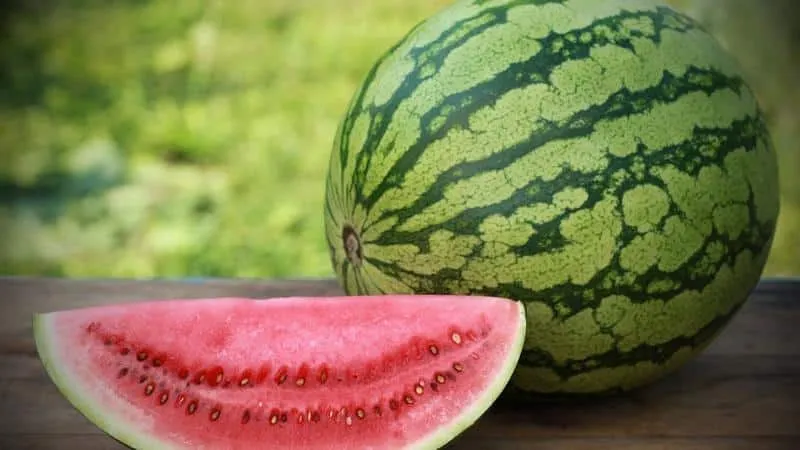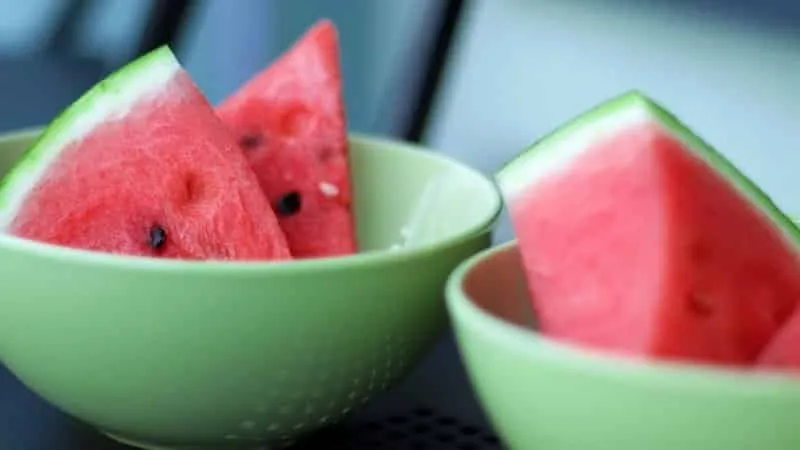Many people believe that watermelon is a product that can be consumed in unlimited quantities. However, this is far from the truth. This fruit has the ability to accumulate nitrates, which nullifies its nutritional value and increases the risk of poisoning. To benefit from watermelons, it is essential to know where and how to buy them and in what quantities to eat them. In this case, all the micronutrients and vitamins will be absorbed without harm to health.
Table of contents
Chemical Composition, Caloric Content, and Micronutrients in Watermelon

The presence of 18 amino acids, nearly all known vitamins, and essential minerals in watermelon makes it an indispensable, easily digestible product.
The low caloric content — 30 kcal — is due to the following macronutrient composition per 100 g: proteins — 0.6 g, fats — 0.2 g, carbohydrates — 7.6 g. The majority consists of water — 91.5 g. Fiber accounts for only 0.4 g.
Among the vitamins, the highest proportions are: C, beta-carotene, B5, A, and B6. The key minerals include silicon, calcium, magnesium, potassium, sodium, iron, zinc, and phosphorus.
Special mention should be made of the amino acids in watermelon, which are typically found in animal-based foods. Their content per 100 g does not exceed 1.5%, but they contribute to qualitative changes in cellular metabolism.
For example, lysine — an essential amino acid not synthesized by the human body — improves calcium absorption and enhances vascular elasticity by reducing triglyceride levels in the blood (fatty plaques).
Threonine is necessary for protein synthesis. It helps detoxify the liver and improves skin appearance.
The amino acid isoleucine regulates cellular metabolic processes. It is vital for people who consume large amounts of fats and carbohydrates, as it prevents diabetic ketoacidosis — a metabolic disorder caused by insulin deficiency due to fatty diets or frequent fasting.
Important. The arginine in watermelon makes it particularly beneficial for children's nutrition. During growth, a child's body cannot produce this amino acid on its own. Arginine enters a child's system first through breast milk and later through complementary foods, such as watermelon juice.
Watermelon is not only a healthy treat but also an excellent option for fasting days or mono-diets.
Positive Effects on the Human Body
Consuming watermelon has a pronounced therapeutic effect. The fruit has diuretic and choleretic properties, strengthens the immune system, and helps combat early symptoms of colds, such as fever and inflammation.
Health benefits:
- Laxative effect — accelerates intestinal peristalsis;
- Normalization of high blood pressure due to improved blood flow: blood vessels dilate, and cholesterol is eliminated;
- Prevention of heart attacks and strokes: potassium and magnesium restore elasticity to arteries and veins, preventing wear and tear;
- Combating kidney stones: the alkaline composition of the fruit breaks down kidney stones and facilitates the removal of their residues from the body;
- Beneficial for nephritis and cystitis;
- Liver detoxification: breaks down toxins, removes medication residues, effective after anesthesia or prolonged treatment;
- Fighting inflammation during colds: fever-reducing and immune-boosting effects;
- Improved tissue regeneration: promotes the synthesis of essential amino acids;
- Strengthened immunity: prevention of iron-deficiency anemia and vitamin deficiency;
- Benefits for diabetes: simple sugars and carbohydrates in watermelon are absorbed without insulin expenditure;
- Restoration of water-salt balance after hangovers, edema, or body acidity;
- Relief of headaches caused by constricted blood vessels.
The overall effect of watermelon on the body is determined by its composition. Vitamins A, C, E, and K, along with iron, zinc, and selenium, combat premature cell, blood vessel, and tissue aging, prevent microbial pathogenesis, and normalize cellular metabolic processes.

Folic acid (vitamin B9) promotes blood renewal, prevents oversaturation with harmful compounds, leading to overall organ rejuvenation. High levels of magnesium, potassium, and sodium positively affect not only the heart muscle but also the nervous system.
Moderate consumption of watermelon dishes enhances stress resistance, strengthens bones and teeth, and normalizes digestion and excretion, resulting in a detoxifying effect.
Calcium in watermelon is in an easily absorbable form, making it particularly recommended for people with hormonal imbalances, as calcium deficiency leads to glandular dysfunction.
The antioxidant lycopene, responsible for watermelon's red color, helps prevent malignant tumors. Its content in watermelon is so low that it poses no risk to allergy sufferers, even in portions of 1 kg, except in rare cases.
Beta-carotene and B vitamins restore immunity, vision, and metabolism while stimulating the central nervous system. Niacin (vitamin PP) enhances energy breakdown from fats and carbohydrates, making watermelon suitable for athletes and those with excess weight.
Important. Watermelon seeds are considered a beneficial part of the fruit. Their caloric content exceeds that of the flesh by more than 15 times. They are rich in minerals such as zinc, selenium, magnesium, potassium, and iron. Recommended for men with prostate issues or impaired sexual function. Watermelon seeds are also used to prevent parasitic infections.
Potential Harm and Contraindications
Watermelon does not contain micronutrients in quantities that cause significant side effects. The main concern lies in its high water content. For this reason, it is recommended to consume it in moderation, preferably in the first half of the day. This precaution applies particularly to people with kidney disorders.
The primary side effects for the body are either tissue edema or dehydration. Individuals react differently, so fluid retention or accelerated excretion is possible.
Caution is advised for people with chronic systemic diseases.
Contraindications:
- High acidity;
- Digestive disorders, pancreatic diseases; ulcers, gastritis during flare-ups;
- Cardiovascular diseases;
- Kidney stones, renal failure;
- Diabetes, especially insipidus;
- Diarrhea, colic, cramps;
- Allergies;
- Edema; dehydration;
- Joint diseases, gout;
- Prostatitis;
- Late-stage pregnancy and breastfeeding.
The situation worsens if the fruit contains nitrates. Therefore, only ripe, autumn-harvested or homegrown watermelons should be consumed. A healthy watermelon has vibrant, porous flesh (not crystallized), without yellow streaks on the rind or white veins in the flesh, which indicate excessive nitrogen and nitrate content.
Important. The main issue with watermelons is nitrate content, which particularly affects children. Measuring exact nitrate levels is impossible, raising doubts about their safety in children's diets. Preference should be given to whole, uncut watermelons (4-6 kg) with quality certificates, purchased from reputable sellers.
Safe Daily Intake
Among nutritionists, there is much debate about watermelon consumption norms, indicating individual sensitivity to the fruit, which can only be determined through trial and error. Some doctors recommend watermelon diets lasting 3-4 days with an intake of up to 2-2.5 kg per day.
For the average person, 2-3 slices (400-600 g) per serving is typical. Most people with a balanced diet cannot eat more than this. However, even 1 kg of watermelon will not significantly affect a healthy body.
Pregnant and breastfeeding women are allowed 2-3 medium slices per day. Children aged 6 and older — 200-400 g. For infants, no more than 50 g (1-2 slices), 100 g (2-3 slices), or 150 g (3-4 slices) is recommended.

Patients on special diets should consult their doctors about safe intake levels. Typically, this is 1-2 slices per day, which should not cause significant side effects.
Those trying to lose weight with watermelon should be cautious. Watermelon diets are popular and recommended by many nutritionists but require a careful approach.
On one hand, consuming 3-4 kg of watermelon per day can nearly cover the daily requirement of essential micronutrients and vitamins. On the other hand, excessive diuresis may flush them out. Therefore, such diets should last no longer than a week and only for people with a healthy urinary system. High-carb and high-fat foods should be avoided.
Important. Use watermelon as an appetizer 20-30 minutes before the main meal, preferably lunch. Watermelon slices are also suitable for a mid-morning or afternoon snack. A single serving is 200-300 g.
What Happens If You Overeat Watermelon?
Despite its dietary benefits, excessive consumption may cause unwanted symptoms.
Common signs of overeating:
- Bloating, colic, and diarrhea;
- Frequent urination;
- Nausea, stomach heaviness;
- Drowsiness, weakness;
- Increased appetite, hunger pangs;
- Kidney failure (in severe cases).
Nitrate poisoning symptoms include headaches, dizziness, nausea, weakness, vomiting, sharp stomach pain, and fever. In such cases, gastric lavage and emergency medical assistance are necessary.
To minimize risks, consume only the inner flesh, as nitrates accumulate near the stem and under the rind (2-4 cm).
Conclusion
Watermelon is an excellent food for overall health and immune support. However, its consumption requires a sensible approach. People with internal organ conditions should limit but not avoid it. Children's intake should be restricted due to potential nitrate content. Therefore, even adults should adhere to recommended portions.







